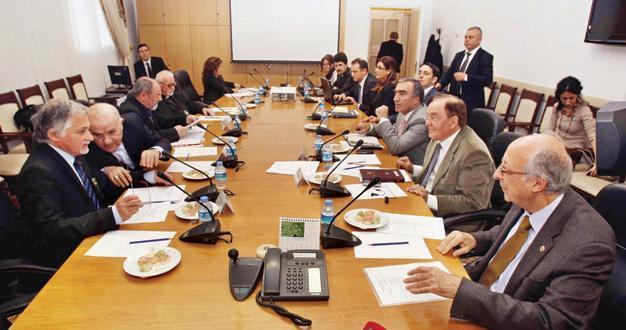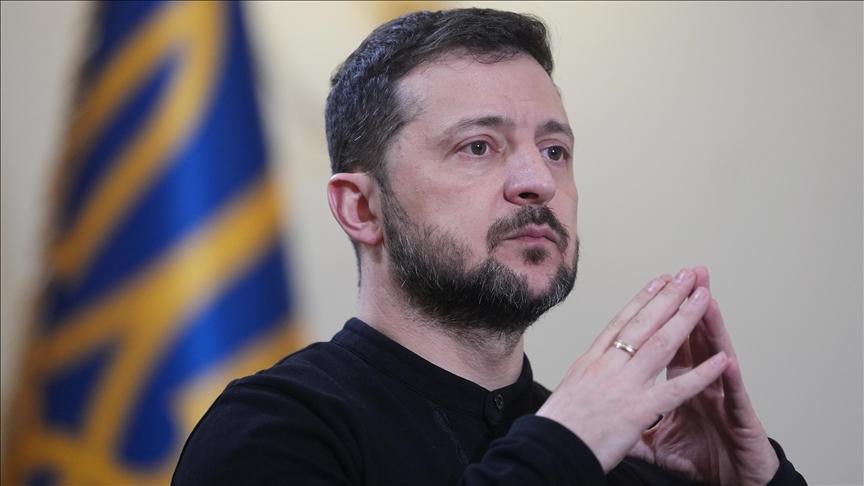Will AKP use presidency as a trump card?
ANKARA - Hürriyet Daily News

A parliamentary commission has started writing the new constitution. AA photo
An inclination toward the semi-presidential system has emerged at the central executive board (MYK) of the ruling Justice and Development Party (AKP). Following Prime Minister Recep Tayyip Erdoğan’s statements, party spokesmen have also issued over-enthusiastic statements about the presidential system. These statements have created unease in the opposition, especially among main opposition Republican People’s Party (CHP) deputies. They have added to the already existing concerns that the “AKP might bring in a presidential system at the last minute.”An influential member of the Constitution Conciliation Commission expressed this concern as follows during a recent conversation: “The AKP might want to take the new constitution to a referendum, all in one package which contains articles agreed upon in the commission together with the presidential system. It does not have enough votes for this, but it can seek support from other parties.”
Can the AKP really make a last-minute surprise and bring in a “presidential” or “semi-presidential” system to the commission? Or would it be engaged in an effort to achieve this alone? The AKP is planning to keep the debate on the presidential system on the agenda and suggest it at the commission. We had seen the prelude to this in the new constitution draft it had sent to the AKP Women’s Branch and to the Parliamentary Speaker’s Office. The AKP Women’s Branch had fired the signal flare and argued that “the presidential system should be adopted.” A week after that, Deputy Prime Minister Bekir Bozdağ publicly voiced the first serious proposal. In the past month, among the nearly 40,000 proposals sent to the Constitution Conciliation Commission – which the CHP believes are being manipulated – there are persistent demands for a presidential system.
According to the consensus reached at the Parliament’s Constitution Conciliation Commission, articles are accepted by unanimous vote. If one party disagrees, then that article does not pass. The situation at the commission indicates that in the event that the AKP proposes a “presidential system,” the CHP and the Nationalist Movement Party (MHP) will directly oppose it. There is a high probability that the Peace and Democracy Party (BDP) will also reject the motion. What will the AKP do under these circumstances? Leave the table? According to the whispers that have reached me, the answer is no. The AKP will not introduce the presidential system as a sine qua non.
On the contrary, it will use is as a trump card. How? According to the scenario being whispered in the corridors, it will be like this: “The AKP wants to write this constitution together with the contribution of the opposition and receive the title of ‘architect of the first civilian constitution.’ For this, it may sacrifice the presidential system. It may look as if it is very enthusiastic about the presidential system and then it may use it as a trump card when necessary. In order to break the resistance of the opposition at certain significant articles, it may just as well say: ‘I have given up on the presidential system, so you should not insist on these articles. Let’s write a new constitution.’ The AKP may be keeping the bar very high for this purpose.”
An influential AKP member said, “The presidential system is not a sine qua non for us. If there is no consensus, we may continue with the existing system. We do not have this as a red line on the table. Yes, we do want it, but if it doesn’t pan out, then it’s not the end of the road.”
If the scenario whispered in the corridors does come true, then the very strong demand at the top levels of the AKP for a new constitution will postpone the passion for the “presidential system” until another more convenient time.
Evren and Sezer could reject coup research commission
Turkey’s Parliamentary Coup Research Commission wants to visit former President Süleyman Demirel at his home and listen to his memories of the March 12, 1971, memorandum, the Sept. 12, 1980, coup and the Feb. 28, 1997, post-modern coup. The commission is also testing the waters for a home visit to seventh President Kenan Evren, who orchestrated the Sept. 12 coup, and 10th President Ahmet Necdet Sezer, who was in office during the process leading to the April 27 declaration of 2007. The commission will reach a decision this week; however, if the former presidents do not wish to testify, there is no legal basis for the commission to force them to do so because the presidents cannot be approached except for reasons of “treason.” Unless the three former presidents agree, then it looks as if it will not be very easy for the commission to take their opinions. It is being whispered that Demirel might be willing to talk but the expectation that Evren and Sezer will reject the proposal is high.
Umbrella party for the left: Will it be formed?
Also known as Abdullah Öcalan’s project, the Peoples’ Democratic Congress (HDK) met last week and decided to become a political party. Their target is known to be the project of the Kurdish movement to open up to the Turkish left. Their first aim is to have the “umbrella party” enter the 2014 local elections. The Peace and Democracy Party (BDP), the Party of Labor (EMEP), the Socialist Democracy Party (SDP), the Socialist Party of the Oppressed (ESP) have been included in the movement, but other significant components of the left, such as the Freedom and Solidarity Party (ÖDP), the Halk Evleri (People’s Houses) and the Turkish Communist Party (TKP) have not participated. Those components who have joined the umbrella party are debating whether to close their own legal entities. Will the BDP deputies resign and join the newly formed HDK? It is not clear yet. It is apparent that other leftist entities are concerned that the strong BDP would melt their own selves. There have been previous attempts to form an umbrella party, but they have not succeeded because of these reservations.











